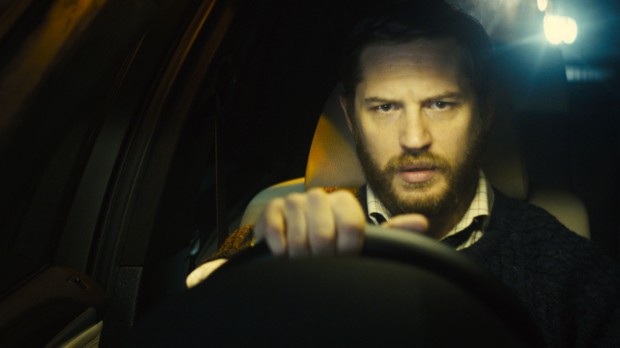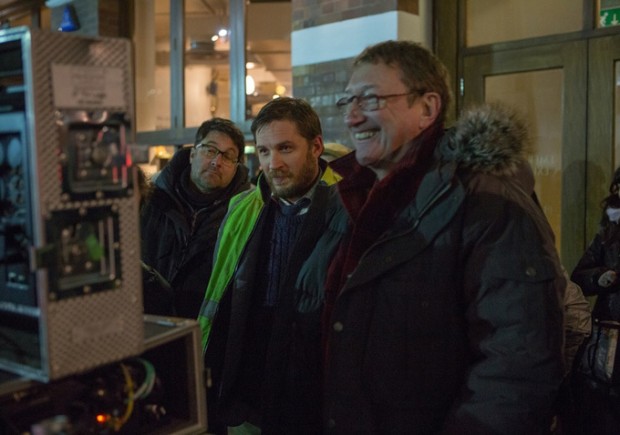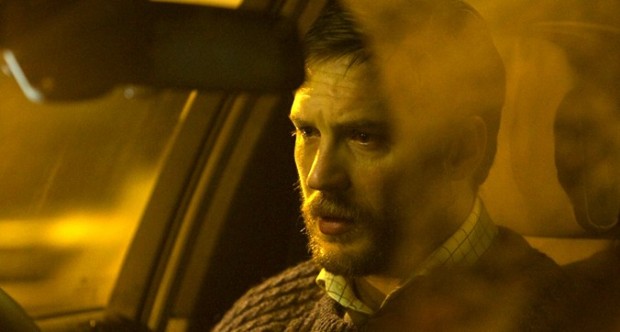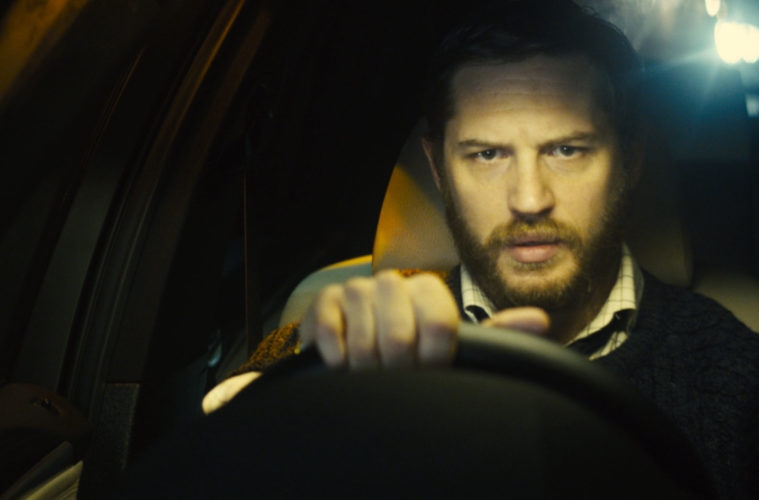
Despite being about a nun and a homeless veteran-turned-gangster falling in love, Steven Knight‘s Humingbird, known as Redemption in the states, was a fairly conventional movie. It was a well-structured yarn, with Jason Statham showing a new side of himself. However, the Eastern Promises writer’s follow-up film, Locke, is less conventional, partially because of its production.
There’s plenty of one-location movies, but showing a cinematic journey in the span of 85 minutes almost completely set in a car is still quite a feat. A lot of credit goes to Tom Hardy, playing a construction foreman whose life is falling apart. It’s a suspense film that gets its thrills from drama, not guns.
Writer-director Steven Knight discussed with us the project’s genesis, his knack for clarity, and why writing in Hollywood is maybe more enjoyable than working in Britain. Check out the conversation below.
It’s a common belief that scenes in cars or scenes of characters talking on the phone are usually not very cinematic. I think you’ve really managed to make it cinematic.
I like to give myself a challenge [Laughs].
[Laughs] Is that how this started?
Sort of, yeah. I had just finished directing a much more conventional film. But in the edits of that, I had looked at a lot of test footage from cameras inside cars at night shooting in urban environments. I thought it would be beautiful. I thought, “I wonder if you could use that moving image as a sort of theater and put an actor in it and have them perform a play inside that theater with the moving lights and things. And would that work and would he sustain in there?” And it was a genuine question, because I agree. A lot of conventions suggest that this couldn’t work.
But with Tom Hardy you’ve got a great head start. I just wondered if we couldn’t do something different with this format.
I know you wrote this script with Tom Hardy in mind. How does that affect the writing process, knowing the actor you’re writing for?
It means you can trust them to deliver certain things. If you know that it’s someone of his caliber, then you can almost retreat from anything fancy in terms of dialogue. You know it will work even if you keep it ordinary. But I wanted the whole project to be about the most ordinary man in the world. He’s got an ordinary job. He’s married with two kids. He works with concrete, which isn’t the most interesting material. And we just get in a car and then say, “OK. That’s the starting point. What can we do with that?”
I’m a believer that normally filmmakers only feel they have permission to make a film if there are explosions, or kidnappings, or murder. But for the people involved, in this case, it’s the end of the world. It’s a tragedy. But it’s an ordinary tragedy. So I wondered if the familiarity of the dilemma, if you like, or the nature of the dilemma, would be enough to sustain an audience. The emotional response has been allowed to go up. It’s been overwhelming. It’s been phenomenal. People come and say, “This is the journey I didn’t make. This is the journey my dad didn’t make.” It really struck a chord.
Mentioning that challenge of not knowing how it was going to work, when did you get a sense of the film was working? Was it those responses?
Well, I thought it was working for me when we got into the editing room and I thought, “This is where I like it.” [Laughs] You never know if you are going to be in the minority, though. And then we showed it people we know and of course they said, “Oh, it’s wonderful.” But then you never know if that’s real. Then we showed it at the Venice Film Festival and the response was absolutely amazing. On that night we realized this works because people had tears in their eyes and a standing ovation. The Venice audience can be very tough, but it was fantastic. So we thought, “Well, this has worked.”

Coming off Hummingbird, what lessons did you take away from that experience that you applied to Locke?
I think the thing I learned about myself is what I’m interested in is capturing performance and really wanting to do what a camera can do, which is just roll and let someone do this thing, whatever actors are able to do to engage people so that people see themselves, they see their lives reflected, and really give some space to that where you are not having to worry so much about anything else other than the performance. In this controlled environment, this is purely dialogue and performance. So it’s what I think I can do best, and so I thought I would just do that rather than do the other stuff.
Looking at Locke and Hummingbird, they’re movies that only feature the bare essentials. They’re just very cleanly told stories. Is that just your natural sensibility?
Yes. I hope so, because I think clarity…Well, there’s two ways of going, I think. I think clarity of story is what I try to do. But I do think, as well, there are other occasions in other genres and other writers who may avert you out of almost the obscurity of what they are doing. And that’s fine as well. But I just hope that choosing odd forms or odd situations, if you do that, if you are going to go far as in terms of the subject matter, you better be simple in the way you deliver it. Otherwise, you are going doubly away from what people are used to. So I try to keep it simple if I can.
When you got down to writing Locke, was it a simple writing process?
It came really quick. In my experience, those that come quickly work best. This was very quick. I had spoken to Tom already and then sat down, I think, over a period of about three weeks the script came together. And when it comes like that, it becomes obvious what to do next. That’s normally a good sign. And then Tom read it and liked it. And we were shooting it by February, which is great.
I read that after you turned your first draft in you were doing rehearsals five weeks later.
The problem is it might give false hope to people that this is how it works. It never works like this. It doesn’t work like this for me, either. This is just a one-off occasion when all the doors just flew open. Oh God, I do hope for that, though.
How many drafts do you usually write?
It depends. If it’s myself directing, it would only be two. But normally, because I normally write within the studio system over here in Los Angeles, and the studio system is great because it’s solid and it’s contracted and you know where you stand. But there are normally four or five drafts of a script before it gets anywhere near income.
How about in Britain? How is the writing over there?
It’s less structured than it is in the US because the contracts are less structured. In my day job, as I think of it, I like the fact that it’s structured because you know what is required. I think the British system is a little bit more ad hoc. But when I’m doing it for myself, then obviously the only person who is going to change it is me, so that’s fine. I probably should go through it more often, but I don’t. Once it’s done, it’s done I think.
When you are a hired hand for a script, is it a different writing process versus writing your own script? Are you thinking about how it’s going to be received or is it still just telling the story you want to tell?
Sometimes, yeah. It’s usually a bit of both. You’d only choose to do something if you were interested in what the story is. If I disagree with the person who is going to receive the script in terms of what’s required, then I’ll try and write it the way…If the person who is paying for me to do it wants it done in a different way, then I’ll do it, because that’s the nature of the work. You have to be realistic. And you also have to accept that you might be wrong [Laughs]. They might be right. And often, they are.
How about on Locke? What kind of collaborators do you have on a film like this?
In terms of the script, I didn’t. But in terms of everything else, obviously Haris Zambarloukos is the director of photography. He’s a master at the image. And it looks so beautiful because of him, really. And then you collaborate, obviously, in terms of the performance with the actors. But if you write and direct, then you do have pretty much control of how it’s going to be.
Because of the way the movie was shot, was there a lot of rehearsal?
We did five days around the table with the other actors. So there’s Tom, myself, and the other actors who made the phone calls all sitting around. And we just read through the script over five days. Whatever directing was needed was done then, and whatever changes were done then. That sort of meant that when we were on the road, I didn’t really need to have to direct anyone in terms of performance because we had already done all of that. After that, it was just a question of getting it down.
You’ve said in the past that the film is “like a play. If something happens that’s wrong, just go with it,” and, for the actors, I imagine that’s very freeing.
Absolutely. Because we shot it beginning to end, in total, about 16 times, if something did go wrong, you knew that it would go wrong in a different place the next time. So you didn’t have to sort of agonize over it the way you would if you were breaking it down into scenes.
How did that idea come about of shooting the film over and over again?
There’s always a good logical reason for not doing the logical thing when you are making films. You never do even the most obvious way. But with this, I thought, “Well, why not do it like this?” So we didn’t break it down so that we did one phone call over and over again in order to maintain continuity. We just set off and did the whole film, because otherwise, it would have been impossible, I think, to worry about the motorway continuity. We just shot it and just assumed that people would not be looking at the background too much.

Locke is now in theaters.

